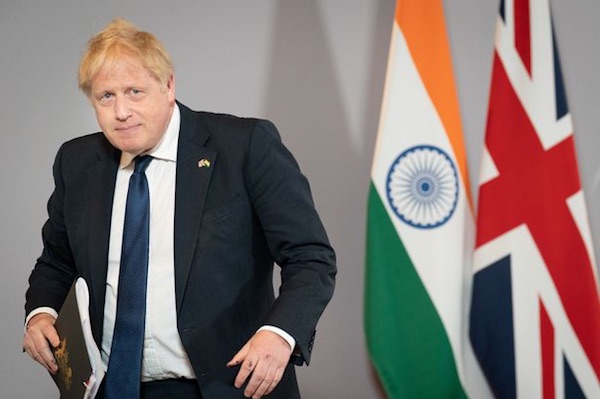
The British government has indicated it will announce legislation in a speech by the English queen to allow it to formally renege on sections of the Withdrawal Agreement of Brexit, with the Irish Protocol set to be the main target.
The move later next month will break international law, but British Prime Minister Boris Johnson is said to believe it will win him support among unionists and his own backbenchers, despite evidence that political opposition to the Protocol has dissipated.
The Brexit deal involves spot checks on certain goods traded at ports in in the north of Ireland, helping to prevent a reinforcement of the border through Ireland.
The port checks have been denounced by hardline unionists as an ‘Irish Sea Border’. Organising rallies against the measure have been struggling to maintain momentum, with less than fifty turning out last weekend to support an anti-protocol band parade and rally in Newbuildings, County Derry, while little over a hundred attended a similar event in east Belfast.
Election opinion polls have also indicated a swing away from the extremist Traditional Unionist Voice party, which has campaigned almost exclusively on its opposition to the protocol. Canvassers have reported that it is not an issue which is being raised on doorsteps.
Neverthless, Johnson declared this week he is ready to take unilateral measures if necessary to “fix” the deal with the EU, claiming it “does not command the confidence of a large part” of the north’s population. British officials also falsely claimed there was “societal disruption” in the North due to the Protocol.
The move comes barely a week ahead of the Stormont election on May 5, and has fulfilled predictions of a deliberate attempt to interfere in the election in support of hardline unionism.
There was a broad and strongly hostile response in Ireland and the EU to the move.
“The Tories are completely out of touch with the majority of people in the north who support the Protocol, which is a direct consequence of Brexit,” Sinn Féin’s Michelle O’Neill saod.
“Once more, any unilateral action on the Protocol would derail talks with the EU, and breach international law which must be respected.”
In an interview with PA news, Ms O’Neill said that the new trading arrangements were a result of Brexit, which her party had opposed.
She said: “We wouldn’t be in the position we are today if it wasn’t for the Tories and the DUP. They collectively delivered us the hardest possible Brexit; we sought to achieve some mitigation against that.
“That is the protocol which we wouldn’t have if we didn’t have Brexit. So the DUP and the Tories have to shoulder responsibility for where we are today.
“This was always about an English agenda, an English nationalist agenda, and it was never in our interests here.
“We have to fight very hard for the protocol because that does give us some protection.
“The British government have created chaos along with the DUP, created chaos, instability, uncertainty.
“Our local businesses can’t plan for the future, they can’t avail of the opportunities that the protocol presents because of the approach of the DUP and the Tories. People have had enough of that.”
The DUP collapsed the Stormont powersharing Executive earlier this year in protest at the Protocol and have stated that they will not re-enter power-sharing government after next week’s elections unless Westminster changes the Protocol
Ms O’Neill said the DUP tactics were “madness”.
She said: “The DUP are fighting the election with a five point plan. You can’t deliver that plan unless you are in an Executive.”
Ms O’Neill added that the severity of Brexit was actually increasing support for Irish unity.
“There has been seismic change in society, particularly in the aftermath of Brexit, something that we didn’t vote for, but which has been foisted upon us,” she said.
“So I think a lot of people are now considering the constitutional position because Brexit has pulled us out of the EU, stolen our EU citizenship from us.
“I think a lot of people are now thinking about where do they want to be in the future, where do they see themselves, do they value their European citizenship?
“And the EU have said that in the event of a successful unity referendum that the whole of the country would be back within the EU, so I think that is a big question for a lot of people to ponder on and I think they are actively pondering on it.
“I am certainly talking to people who are thinking about the future.”
![[Irish Republican News]](https://republican-news.org/graphics/title_gifs/rn.gif)
![[Irish Republican News]](https://republican-news.org/graphics/title_gifs/harp.gif)

